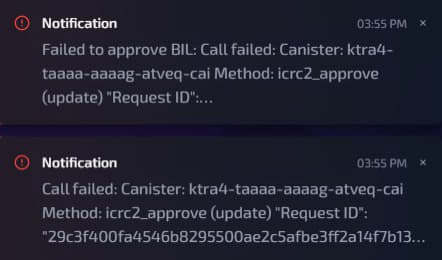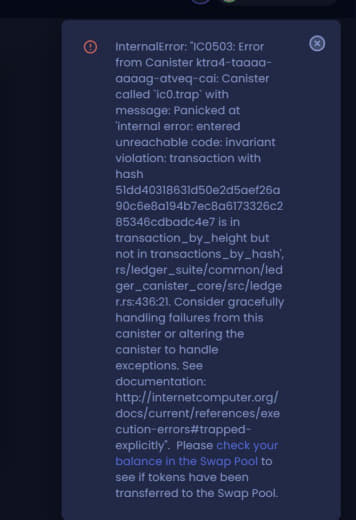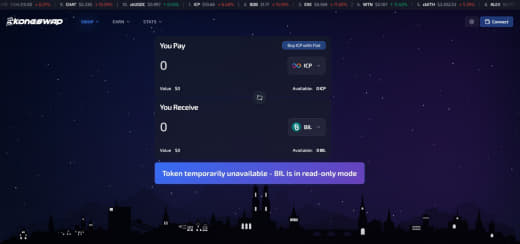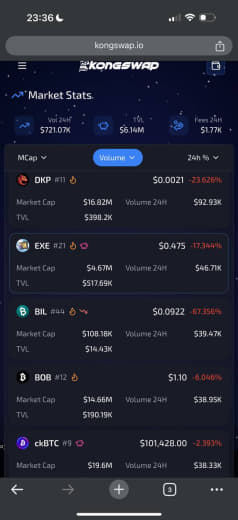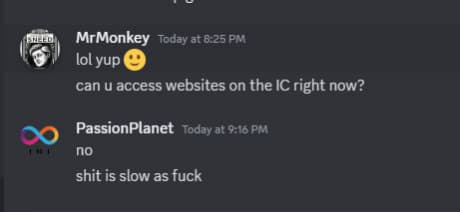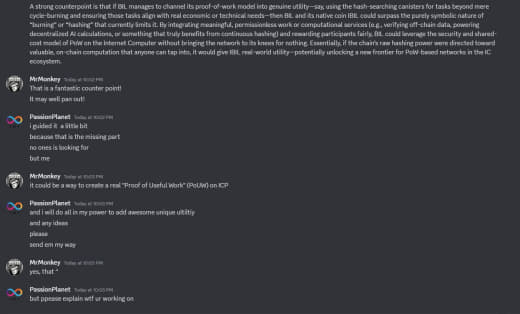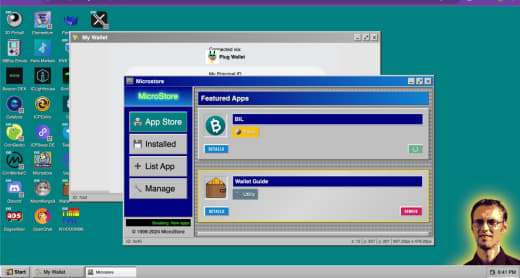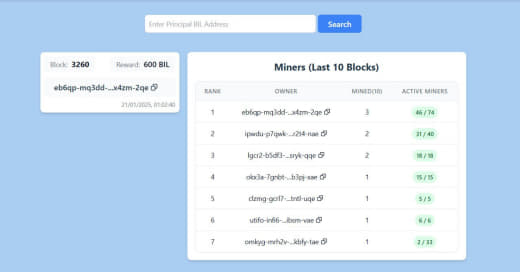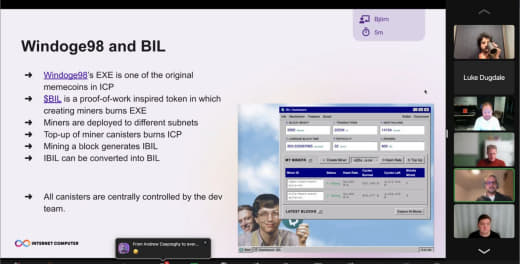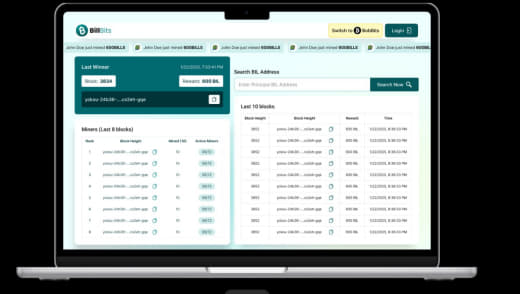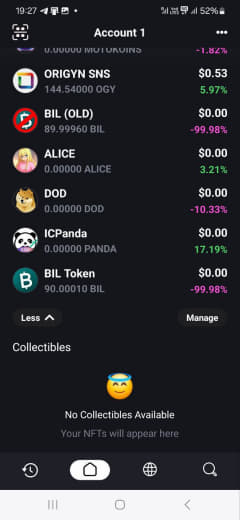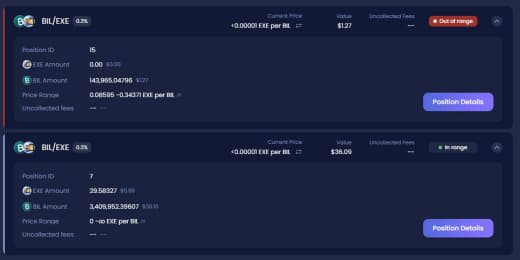Bilzzzz💤 Dream Team
Previous messages
18 January 2025
P
21:03
PASSION
mother fuckers
21:03
i hate wasps
21:03
and it sounds like that
21:03
so
21:03
fuck wasms
21:03
lol
21:03
anyone listening to this debate on x right now?
21:03
where the fk is dfinity they should take this dude to the wood shed lol
A
21:04
Az
Which one?
P
21:11
bill is up
21:11
its showing
21:11
:D
A
21:11
Az
Yes balances back but still read onlonlyy mode
P
21:12
PASSION
ok
21:12
when did that pop up
A
21:12
Az
A few mins ago
P
21:13
PASSION
im fast ;)
21:13
so were close
21:13
cant wait luke
21:13
but
21:13
price will take a hit
21:13
for sure
21:13
we have a plan
A
21:13
Az
Nice
P
21:13
PASSION
ahh i cant wait — okok patience
21:13
we need to have a call after were up and running
A
21:13
Az
Yeah
P
21:13
PASSION
commuincation is key here and you have so many backing you up
21:14
this can be very big for plug too
A
21:14
Az
Yes
P
21:14
PASSION
we can build you a plug wallet army
21:14
lol
21:14
instead of everyone shiting on it
21:14
JKJK
A
21:14
Az
Yeah this miner POW
P
21:14
PASSION
its like 20% fud
21:14
lol
21:14
yeah
A
21:14
Az
Is going to be big for whole icp
P
21:14
PASSION
this shit
21:14
is game chaing
21:14
but
21:14
we need to give ultlity to ibil and bil
21:14
dw
A
21:14
Az
FUD fud fud until breakout
P
21:14
PASSION
we got IDEAS
A
21:14
Az
Then no fud
P
21:14
PASSION
correct
21:14
exactly
21:14
lol
21:14
well
21:15
we already won over all of pumpers and jordan again lol
21:15
now
21:15
bobtards
21:15
lol
21:15
first this ignore you
21:15
than they fight you
21:15
than
21:15
yyou win
21:15
ahhaha
21:18
im hungry time to eat as many blocks as i can before bil come back
21:18
limit the sell pressure cuz im not fkin sellin lol
d
A
21:36
Az
Yeah we should work on it
P
21:43
PASSION
thats you and your team —-
21:44
i cant wait to hear it
21:44
i dont fully understand ordinals but i know they have a good market
21:44
and that would be cool
21:44
im thinking more along the line of fair launches though a burn mechisim some how —
21:44
shill has ideas
21:44
everyone has ideas i want to hear them all and i cant wait to see waht we do — just next time — lest test more before launch hahahahah
A
21:46
Az
Yes - but this created many unexpected system failures: first subnet overload, then migration issues and now ledger problems (we were told our ledger has way over the normal amount of blocks) (usually around 2000 our has close to 30k) this is is the icrc ledger not internal ledger
21:46
So we kind of had to shape it around the ic, and the ic had to be set up to work with everything
21:46
But it’s looking like this will be the final step 😂 fingers crossed
21:46
Then we can replicate the system if we want
P
21:47
PASSION
wow
21:47
thats great news!~!
21:47
so much to think about and work on once we smooth this all out and the market begins to value your work
21:47
great job
A
23:50
Az
Ok
23:50
The canister is coming off read only very soon
23:50
Means will be ready to go back up on kong & icpswap
P
23:51
PASSION
nice
A
23:51
Az
Will be key to let icpswap and kong know
23:51
I guess shill is in here
23:51
But they might have to do smth on their side to get trading back up
P
23:55
PASSION
the call fail should go thru after the updates from read only right?
23:55
maybe?
23:55
lol
23:55
i am wishful thinking here
A
23:55
Az
Yes
23:55
these hsould life
23:55
well see
23:55
:D
A
23:56
Az
Well let’s see might be the case that Kong team needs to do something not sure if it’s automatic soon as canister out of read onlonlyy very
23:56
We’ll see - but let’s get it live first not up yet
P
23:58
PASSION
all good shill is kong so
23:58
lol
19 January 2025
M
01:58
Mazen
Ledger is upgraded and now is open to transactions
A
02:09
Az
We’re back!
JP
03:57
Jesse Pinkman
But we can’t trade it on icpswap or Kong?
03:57
What is going on
JP
06:27
Jesse Pinkman
Failed to approve BIL: Call was rejected: Request ID: 522a7e2d6bace0d6313e8aacfdb3b3888be28dd2332543344f6fd831f0c43837 Reject code: 5 Reject text: Error from Canister ktra4-taaaa-aaaag-atveq-cai: Canister called
ic0.trap with message: Panicked at 'internal error: entered unreachable code: invariant violation: transaction with hash 51dd40318631d50e2d5aef26a90c6e8a194b7ec8a6173326c285346cdbadc4e7 is in transaction_by_height but not in transactions_by_hash', rs/ledger_suite/common/ledger_canister_core/src/ledger.rs:436:21. Consider gracefully handling failures from this canister or altering the canister to handle exceptions. See documentation: http://internetcomputer.org/docs/current/references/execution-errors#trapped-explicitly
P
09:19
PASSION
wtfff
09:19
so we need to roll out fixes @shillgatesy
09:19
the sell pressure is going to be nuts
👍
d
09:19
sucks
A
15:37
Az
ok everything back up smooth again
15:37
god that was stressful
15:37
and the market hasn't nuked as hard as i thought it would (might be speaking too soon)
18:18
@shillgatesy do you know the issue?
SG
18:20
Shill Gates
yeah they turned it off cause funds were getting stuck. should be back in a few mins
🫡
JP
A
22:01
Az
yoyo
22:02
what's the drill with EXE/BIL pool?
22:02
want to make a trade 😂
22:03
slippage pretty high but im down anyway 😂 might make a few trades slowly
20 January 2025
P
01:44
PASSION
LFG
01:44
im doing great honestly
01:44
buttt
01:44
i did take the highest risk
01:44
and made sure most of that bil is in good hands
01:44
im not just workin my wallet lol
01:44
im helping others
01:44
and getting ready for the dapp launch soon right @Co_BreakingBits
01:45
can we please get Sam the Grower in here PLEASE
01:45
Goiood work everyone
01:45
ii have a plan
01:45
going to tell shill @shillgatesy tn — lets meet tomorrow?
A
01:52
Az
Can do
01:52
What’s happening to Windoge though? Do we need to put back top up with EXE?
P
01:53
PASSION
not sure but happy its so cheap
01:53
people are completly overlooking what is being built
01:53
with exe standalone as well as now with bil
01:53
this shit and what we can do is wild
01:53
they are 10 steps behind
A
01:53
Az
Yeah even the volume numbers for both are looking up
P
01:53
PASSION
thats our opportuntiy IMHO
01:53
i know
01:53
the burn is moving up
02:36
If exe and bil together are pulling move volume than bob, market cap is going to come match
P
03:01
PASSION
lol
03:01
luke
03:01
you are about to learn what passion is all about this week
03:01
i mean
03:01
i know you prob have a good idea
03:01
but
03:01
just watch
03:01
i learned so much from bob
03:01
but what bob was missing
03:01
is what i brought to the table
03:01
MARKETING AND COMMUNITY BUILDING
03:01
its my speicalltity
P
05:11
PASSION
uh
05:11
are we stock with blocks?
A
05:12
Az
it looks like it is slow now yes
P
05:12
PASSION
why is that hkmm
A
05:12
Az
but seems like everything is up so should be flowing smooth
P
05:12
PASSION
correct
05:12
33 zeros
05:12
it was at 31
05:12
than 32
05:12
33
05:13
made a big differnec
05:13
let me throw more hash test its
05:13
see if it works
05:13
are we burning as it appears "stuck"
05:14
are you sure the back end is functioning — cuz my dapp is not pulling anything as of now— ill keep trying lmk
05:15
ok my dapp is back up buy shit is very slow for sure no idea why lol i love this shit
05:15
i did notice even though we did set speed some miners still bur faster im assuming thats cuz the canister (miner) is on a faster subnet?
05:16
snass did ask that about 40 minutes ago
05:16
and hes — how do you say — ic og
05:16
lol
A
05:18
Az
ok it's running good now
05:18
i had to top up a canister should be auto but sometimes needs a kick
P
05:19
PASSION
ahhahah
05:20
lol
05:20
wow
05:20
spit out so much ahhahah
P
05:35
PASSION
im closing in on block 600
05:36
going to be building massive lp soon
05:36
:D
05:50
BTW whats the update on all the ones stuck in the back end if u will im stil showing 414 in my back end but i know 200 times i pressed the swap miner buttuon it did not spawn — when can we espect fix on this — some ogs are calling this a big deal and i want to sort that out asap — i already started filling up some of the erarly miners rigs to make up for the insane burn when it was migrated to the multi subnet
05:50
im doing the best i can and im not on either "dev" team im here to helpn make shit work and communicte that to the community i love building and this is a golden opporuntiy to do and build things that have never been done or built before
05:53
wowow
05:53
i need to break this down
05:53
look at what snas just told me i asked his for an honest opinon good bad ugly with bil
05:53
MrMonkey — Today at 9:38 PM
you wanna know what I really think? you don't have to see the code for that....but it's complicated 😛 but here goes.
As you know, bob just burns cycles while bil does real work, looking for hashes. The main difference from a network perspective is that actually doing that type of intensive work (looking for hashes basically behaves like an infinite loop and is very intense for the cpu) tends to bring the network to its knees.
But isn't looking for hashes better? More fair somehow, or something? Like bitcoin?
Well, on BTC the reason hash searching means it's fair is indeed that anyone can do it. You can use your gfx card or a super computer, or pen and pencil, and the only thing that affects is your chances of finding it first, in such a way that you can know that anyone on earth who comes running with the solution to the hash, must indeed have spent some rough amount of what it should cost to find it, on average (they could be very lucky, with pen and paper...once.)
BTC PoW is really a way to create a fair method for proving /cost/ - there is no way to cheat, to keep finding hashes you must spend the money on the energy, and the cool part is that it is a totally permissionless system that anyone can join with whatever new method they cook up for finding hashes faster (which is why BTC also drives energy efficiency innovation)
But back to BIL. So, here's some FUD (that I will kind of disprove).
"Since BIL actually solves hashes, I could set my own computers at mining hashes more efficiently and win every block!" - in principle, this is true!
But BIL would block that, in this way: They only accept solutions from their well known miner canisters, that they control. Which in turn means they know they code on those canisters, and can make sure they don't have code that allows someone to "cheat" and feed a solved hash to that miner that the miner can report to win the block.
So, in the end, BIL's model 100% boils down to the fact that they control all the miners, otherwise this exploit would be possible and obvious.
But then, given that the whole model is based on controlling the miners, and remembering that we talked about how actually searching for hashes brings the network to its knees...couldn't we force all the miners to work a little less hard, in a fair way where they all have to work less hard? Couldn't we maybe hash, like..a bit? And maybe burn some gas a bit? In some kind of BOB-BIL hybrid?
But then you go more and more in that direction and realize the hashing isn't really needed. Like I said with BTC, what you're trying to do in the end is create a system with Proof of Cost. For BTC, hashing is a good Proof of Cost via PoW that also allows anyone to participate with whatever hardware. On ICP, BOB is Proof of Cost via Proof of Burn, which is a fair system and the main difference against BTC is that it doesn't allow anyone to participate with their own hardware. And neither does BIL.
So BIL doesn't really gain an advantage over BOB by doing it's PoC via PoW instead of PoB. Both projects have the same reach (ICP users) and the same level of PoC fairness, just that one brings the network (needlessly, one could argue) to its knees and the other doesn't.
I suspect, btw, that BOB launched as PoW, saw the network go down, thought "oh shit", went through roughly this reasoning ^^ and decided PoB was as good as PoW for this use case. And that's why the network survived 😛
Anyway, this means that I actually think between BOB and BIL, maybe BOB > BIL, but ofc BTC >> BOB > BIL
you wanna know what I really think? you don't have to see the code for that....but it's complicated 😛 but here goes.
As you know, bob just burns cycles while bil does real work, looking for hashes. The main difference from a network perspective is that actually doing that type of intensive work (looking for hashes basically behaves like an infinite loop and is very intense for the cpu) tends to bring the network to its knees.
But isn't looking for hashes better? More fair somehow, or something? Like bitcoin?
Well, on BTC the reason hash searching means it's fair is indeed that anyone can do it. You can use your gfx card or a super computer, or pen and pencil, and the only thing that affects is your chances of finding it first, in such a way that you can know that anyone on earth who comes running with the solution to the hash, must indeed have spent some rough amount of what it should cost to find it, on average (they could be very lucky, with pen and paper...once.)
BTC PoW is really a way to create a fair method for proving /cost/ - there is no way to cheat, to keep finding hashes you must spend the money on the energy, and the cool part is that it is a totally permissionless system that anyone can join with whatever new method they cook up for finding hashes faster (which is why BTC also drives energy efficiency innovation)
But back to BIL. So, here's some FUD (that I will kind of disprove).
"Since BIL actually solves hashes, I could set my own computers at mining hashes more efficiently and win every block!" - in principle, this is true!
But BIL would block that, in this way: They only accept solutions from their well known miner canisters, that they control. Which in turn means they know they code on those canisters, and can make sure they don't have code that allows someone to "cheat" and feed a solved hash to that miner that the miner can report to win the block.
So, in the end, BIL's model 100% boils down to the fact that they control all the miners, otherwise this exploit would be possible and obvious.
But then, given that the whole model is based on controlling the miners, and remembering that we talked about how actually searching for hashes brings the network to its knees...couldn't we force all the miners to work a little less hard, in a fair way where they all have to work less hard? Couldn't we maybe hash, like..a bit? And maybe burn some gas a bit? In some kind of BOB-BIL hybrid?
But then you go more and more in that direction and realize the hashing isn't really needed. Like I said with BTC, what you're trying to do in the end is create a system with Proof of Cost. For BTC, hashing is a good Proof of Cost via PoW that also allows anyone to participate with whatever hardware. On ICP, BOB is Proof of Cost via Proof of Burn, which is a fair system and the main difference against BTC is that it doesn't allow anyone to participate with their own hardware. And neither does BIL.
So BIL doesn't really gain an advantage over BOB by doing it's PoC via PoW instead of PoB. Both projects have the same reach (ICP users) and the same level of PoC fairness, just that one brings the network (needlessly, one could argue) to its knees and the other doesn't.
I suspect, btw, that BOB launched as PoW, saw the network go down, thought "oh shit", went through roughly this reasoning ^^ and decided PoB was as good as PoW for this use case. And that's why the network survived 😛
Anyway, this means that I actually think between BOB and BIL, maybe BOB > BIL, but ofc BTC >> BOB > BIL
05:53
Hope this is helpful
P.S. What if someone made a new coin where the point was that we DO allow "cheaters", i.e. the miners are not controlled by a master and anyone can supply hashes using any hardware they like to the miner canisters....truly like BTC, only on ICP, right? But in this case, you can see how the "mining" canisters that just take solutions from external hardware to send them to some master would only be BTC with meaningless extra steps (that only hurt security a bit compared to BTC), so, alas, there would be no point. But in a way that thought experiment may show why all these mining coins are doomed to fail in the long run.
P.S. What if someone made a new coin where the point was that we DO allow "cheaters", i.e. the miners are not controlled by a master and anyone can supply hashes using any hardware they like to the miner canisters....truly like BTC, only on ICP, right? But in this case, you can see how the "mining" canisters that just take solutions from external hardware to send them to some master would only be BTC with meaningless extra steps (that only hurt security a bit compared to BTC), so, alas, there would be no point. But in a way that thought experiment may show why all these mining coins are doomed to fail in the long run.
A
06:04
Az
interesting
P
06:04
PASSION
snas is big brain
06:04
and he knwos ic like the back of his hand
P
06:32
PASSION
this is good
06:32
image_2025-01-19_22-32-02.png
Not included, change data exporting settings to download.
13.2 KB
06:32
means that our total volume is flushing out all those that were mining with no way to way get any value back — so that sell pressure should give up in about 6-12 hours IMHO —
06:32
either way — we have ourselves a market — lol
06:33
number 7 by volume on kong — song to be #1—- as for the punks who dumps exe — good riddance — better hands to hold anyway IMHO
d
18:52
dantol
In reply to this message
I thought about proof of useful work too. A lot of computational power being wasted rn
A
19:44
Now it’s flat
P
21:42
PASSION
I have a plan in regards to the market.. I'm seeing a lot more new IDs pop up
21:42
This is good the mining is starting to become more decentralized
21:43
Adding utility to the tokens is very important but we have to figure out a way to call all the miners that are stuck in the back que
d
22:09
dantol
In reply to this message
Can you send accounts of users that have this issue? We can manually launch them
21 January 2025
JP
01:04
Jesse Pinkman
Hey guys can we do a small update?
If it is possible
If it is possible
01:06
or if you can duplicate this function and add miner status for us in it?
d
01:07
dantol
In reply to this message
You can make these calls yourself and it gonna be a lot cheaper than inter canister query calls that are as expensive as update calls
JP
01:07
Jesse Pinkman
Since atm we are have to call each miner separately which sometimes we have to do over 1000 calls at the same time
d
JP
d
01:09
dantol
In reply to this message
You can't do query calls from a canister to a canister on different subnet
01:09
It is considered as an update call
01:10
It's not worth it😁
JP
01:11
Jesse Pinkman
okay let me explain our current procedure and help me how we can optimise it
01:11
so give me a min to explain
01:12
to see all the miners
01:13
In reply to this message
now that issue of doing a call for each miner is that as you see the last 10 PID we are sometimes as you can see some people having more than 200 miners so we would have to do more than 1000 calls at the same time so that we can get this table
01:14
so I thought if we can combine it into 1 call for each PID instead calling each miner individually which will cause us calling 1000s of calls at the same time
01:15
what do you suggest @dantol29
01:15
?
d
01:16
dantol
In reply to this message
As I know, there are no batch calls yet. Putting all those calls on BILs backend wouldn't solve the problem
01:17
You can do it by loading data gradually
JP
01:17
Jesse Pinkman
hhmm
d
01:17
dantol
It gonna take a few seconds, but there is no other way, unless you do it off chain
JP
d
01:19
dantol
In reply to this message
I am not sure how fast FE hosted on chain is. How long do you have to wait to load everything?
JP
01:19
but that is not the main issue atm
01:20
the main issue is that 1 IP address is doing so many calls that it gets timed out
01:20
getting completely timed out from doing any IC calls
01:20
for like 10 min
01:20
which i think this will fix putting it all in 1 call in the backend
d
01:21
dantol
Ah, Mz had the same issue
JP
01:23
Jesse Pinkman
In reply to this message
what do u mean by expensive? how much would you estimate it would cost?
01:23
we can contribute into topping up the backend canister
d
01:30
dantol
If we do 100 requests to other canisters every minute, it should be around 10$ a day
JP
01:32
Jesse Pinkman
In reply to this message
we are already doing the calls to each miner already wouldn't that cost the same?
P
01:33
PASSION
who is @clement_plugwallet ? he has not really said anything — we should only have people who are activlity building IMHO i have had my fair share of trouble with trolls
01:33
also
01:33
we need sam in here ASAP
d
JP
01:35
Jesse Pinkman
In reply to this message
well can you just do the call for us and we can monitor and if it needs any cycles we will contribute no problem
A
01:35
Az
Clem core plug member - I added him here so he could react fast
d
JP
01:36
Jesse Pinkman
we can test it and see how it goes
01:36
we can always turn it off if it becomes too heavy of a burden
01:36
would that be difficult?
d
01:39
dantol
A better strategy would be to cache miner statuses and gradually update them every x minutes. This way we avoid redundant calls from every user's device and IP rate limiting
JP
01:41
Jesse Pinkman
In reply to this message
Not a valid strategy as long as we are doing more than 500 Calls not matter the delay the users can potentially get timed out which we should avoid at any cost
d
JP
d
01:44
dantol
It gonna be 2 minutes outdated😁
01:44
Bearable
JP
01:45
Jesse Pinkman
In reply to this message
but not an optimal solution I would rather test the previous suggested solution if possible
if it did not work out for any reason we would resort to your solution
if it did not work out for any reason we would resort to your solution
01:45
unless if you can come up with a better solution than both 😁
01:46
10$ a day is nothing for a permanent solution
d
A
01:47
Az
The problem is our canister is already under high pressure from the network
01:47
So 1000 calls a second for every user opening your dapp is a risk factor on BE canister
01:48
Danils does a lot of caching with plug and it’s a good solution at scale
01:48
Maybe you could share the GitHub and we could add what we think might work? Can also contribute other ideas to the repo
JP
01:49
Jesse Pinkman
yes I agree and a middle solution would be optimal reducing it to 10 calls to the canister by my suggested solution in addition to adding cashing to do a call only every 1-2 min
01:50
or even every 5 min if we have too
01:50
but reducing the calls to only 10 calls should be a priority
01:51
Well
01:51
I understand that you wouldn't want to overload the canister more than it is
01:51
So I will try to come up with a better solution
01:52
if the devs here can share there github username so we can add them as soon as we can
01:52
SG
16:01
Shill Gates
SG
Shill Gates 21.01.2025 15:59:51
can we add the option to top up using exe or icp?
SG
16:01
Shill Gates
A
Az 21.01.2025 16:00:06
Yes I think we could add that again
16:01
Can you put it in the chat for @dantol and Mzi
A
16:01
Az
So we can burn more exe
SG
16:01
Shill Gates
i need to put that treasury wallet to work
16:01
😛
P
18:37
PASSION
LFG
18:38
got some good sleep these past few days
18:38
need to catch up lol
d
SG
20:36
Shill Gates
In reply to this message
well one easy one would be burn bil to mine bil 😛 i still like the token launcher via mining idea too, and the fees from that could be paid in burned bil
🔥
JP
A
20:37
Az
Shall we just
Open bil up to all icrc tokens?
Open bil up to all icrc tokens?
20:37
Burn anything to mine bil?
d
20:38
dantol
In reply to this message
How can we launch tokens by mining? Or you mean launcher of PoW tokens?
SG
20:39
Shill Gates
In reply to this message
my argument against this is that it takes away from the exe bil loop and those other tokens arent necessarily contributing anything. for the token launcher, i think allowing the launched token to be mined with whatever icrc the user wants to use would be cool though
JP
A
20:39
Az
Token launcher is a cool idea but I suspect it will take a while
SG
20:40
Shill Gates
In reply to this message
yeah so, you do a much shorter mining time, and instead of a bonding curve, the tokens are mined and X% can go towards providing a locked LP for the token
P
SG
20:42
Shill Gates
what are some options we have with ibil? i need to look at the code more and see exactly whats going on there. i'm not quite sure what the possibilities are
A
20:43
Az
The options with iBIL are ordinals / inscriptions
SG
20:43
Shill Gates
so when bil is minted, the ibil is burned?
d
C
SG
P
20:44
PASSION
If we open to all tokens
20:44
wont that kill the network?
A
20:45
@dantol29 what do you think?
20:45
Weaving ICRC7 with IBIL?
SG
20:45
Shill Gates
what else would be cool is having a fee on both tokens that gets added to block rewards
d
P
20:46
we need sam in her!!
20:46
no whole ic
20:46
i meant our portion
Shill Gates converted this group to a supergroup
Bilzzzz💤 Dream Team converted a basic group to this supergroup «Bil Dream Team»
P
20:46
PASSION
while slowing all those who use our subnets
20:46
lol
20:46
dfinity will have to have someone full time to work with u
20:46
lol
d
20:46
dantol
Inscriptions are info on IBIL blocks
SG
20:47
Shill Gates
id be more worried about people with bigger bags than me taking our blocks 😛
🤯
P
20:47
i guess they can now with icp, but still opens up more opportunity and dilutes the exe burn
P
20:50
PASSION
thats true shill
20:50
unless speeds stay capped
20:50
than its a game of who can make more miners
20:50
and right now
20:50
it would be a high cost game
20:50
unless you lowered speeds a lot more
20:50
it forces people to make new miners
20:50
and that requres you to use the mechinisim right shill?
20:51
why have 500 miners when you can have 100 @ 250k has vs 50k
A
22:41
Az
Damn bob up!
22 January 2025
A
01:21
Az
imagine buying into bob but at the beginning
JP
P
11:04
PASSION
team
11:04
did we break something
11:04
is it me or are we stuck again?
11:04
ahhh
11:04
11:04
3hrs
JP
11:04
Jesse Pinkman
no blocks?
11:04
for 3 hours
11:04
dam
P
11:05
PASSION
i cant do much but ill top up cycles just in case its smimple— like plugging in the computer when people complain it dont work lol
JP
11:06
Jesse Pinkman
I think it was this canister
11:06
hx36f-waaaa-aaaai-aq32q-cai
d
11:11
dantol
It is out of cycles
P
11:11
PASSION
This cant keep happening— Its not a good look — all the peoples cycles just burned for 3 hours lol right
11:11
or did it stop buring?
11:11
lol
11:11
i topped it up soon
11:11
some
11:11
damn
11:11
we didnt burn tho did we?
11:12
what happens in that situation with burn of cycles?
d
P
11:12
PASSION
okok
11:13
so it pauses all burn on back end
P
21:26
PASSION
NICEEE
21:26
yo
21:26
@Co_BreakingBits lets
21:26
get the link
21:26
clip it
21:26
and use it in content creation
21:26
@azandicaaa you got a link to that?
A
21:26
Az
No it was a closed global r&d
P
21:26
PASSION
how did u see iut
21:26
haha
A
21:26
Az
I’m on the invite list
P
21:26
PASSION
i want in
21:26
damn
21:26
what did they say?
21:26
breif?
21:27
or the went on a little
21:27
damn luke
21:27
look at u
A
21:27
Az
Just talking about Proof of Work
21:27
And how we did the IBIL thing
21:27
And basically saying POW on ic is gonna take off eg bob
JP
22:26
Jesse Pinkman
Did the canister run out of cycles again?
A
22:26
Az
Don’t think so but I’ll check
🫡
JP
22:39
boys are cookin
22:39
been done real soon
22:39
will be*
A
22:39
Az
damn that's an upgrade! nice
22:40
🙂 BilBits v cool
P
22:40
PASSION
yes
22:40
we just need to figure out a way to cool the calls
22:40
so we dont get locked out
22:40
hahaha
22:40
we will figure it out
22:40
but the tool is insane at amplifying the mining experince as a whole
22:41
this will have everything - Gamifaction, giveaways, turtorials, prizes for learning— prizes for creating a your first miner
22:41
hitting your first block
22:41
ect
22:41
lol
22:41
we cookin
A
22:50
Az
I’m checking nft geek to get the token map
22:50
It’s kind of clunky
22:50
How do we get our own holder numbers / pie chart etc?
d
22:56
dantol
In reply to this message
Looks epic. I think if you figure out what's the rate limit and gradually call miners, you can get an active miners number)
23 January 2025
P
05:23
PASSION
when can we get miners stuck out of back end?
05:24
everfything is running smoothly
05:24
tomorrow lp gets added
05:25
i dont think buying open market is the best choice - the market it work itself out — and i think this is going to really take off — espically when the dapp comes out which is getting very close
05:25
we want to perfect it tho
A
13:03
Kong?
P
18:35
PASSION
Yes Kong
18:35
Than we focus on icpswap
A
18:35
Az
Now?
P
18:36
PASSION
Yes the LP should be added by later today. 70k bil and 1500 icp
18:36
Somewhere around there
18:36
Adam is building it we sent him the bill and built our own
18:36
Next is icpswap
A
18:37
Az
You think that will be enough?
18:37
I guess it’s next chunk
18:37
We keep building liq up
P
18:37
PASSION
Yes we keep building
18:38
Focus needs to shift to utility
18:38
Mining is getting more and more crowded
d
A
20:59
Az
I think a POW token launcher
21:00
Bil Launchpad 🚀
21:00
Burn Bil to mine whatever your token is
21:00
But real POW?
21:01
FE for your miner generated by caffeine ai based on BIL’s but with a different design 😂
P
22:43
PASSION
😂😂😂
JP
22:44
network can die just that many times 😄
22:44
or you think not enough people will mine that it will pass?
P
22:45
PASSION
It's been a busy day at work for me. Yeah shill was talking about some really good ideas for utility on the burn bil to launch tokens ie the mechanism would put half of it to burning the other half would sell to get ICP to build the liquidity pools I don't know we can figure it out where it's the least amount of selling pressure but it's something that we need to do. I have a good idea for giving utility via giving reward via ibil for using our dapp.
25 January 2025
P
07:24
PASSION
is the canister out of cycles?
07:24
I will fill it up no blocks in 30 monuites
P
10:07
PASSION
WTF
10:07
WHAT HAPPEN TO BIL
10:07
im fucking mad
10:07
WTF
10:07
!??!?!?!
10:09
40 fucking thousand dollars
10:09
im over this shit
10:09
fuck all of you
10:09
im fucking mad
10:09
wtf happen
10:09
WTF
10:12
WHAT THE FUCK
10:12
I PUT SO MUCH INTO THIS
10:12
luke
10:12
make this right
10:12
10:12
make this right ASAP
10:12
are yu fucking kidding me
10:12
IM FUCKING ljk;dfgaslkjgafdjlk;
10:12
BRO
10:12
100k
10:12
gone
10:12
WTF
10:24
like wtf team
10:24
you better make this right
10:24
what the actual fuck
10:24
plugs rep is done
10:25
we need to fix this ASAP
P
10:42
PASSION
make this right —- please fix this — you guys are ruining shills rep and just allowed for somoene to take most of my money
10:42
wtf
P
11:03
PASSION
guys plesae make this right — please — i was so exctied about bil and what we can do — i put so much time energy money and effort into building out the dapp— were just about done — and this happens
11:03
fix this
11:03
@shillgatesy dont deserve this — i dont deserve this
11:03
please fix this shit asap
SG
Walter White joined group by link from Group
A
12:59
Az
Hey guys
12:59
I just woke up
12:59
Going to figure out what happened
13:10
Alright how does we want to manage this? I guess maybe we post something from the bil account?
13:11
Like a description of what happened etc post modern style
13:11
?
13:12
Well we still have to find out exactly what happened but yeah
JP
13:15
Jesse Pinkman
https://github.com/baolongt/bil-incident/blob/main/README.md
well one of you fucks rugged us or who else have control to the ledger canister
well one of you fucks rugged us or who else have control to the ledger canister
13:16
Post like wtf do we post that the plug team rugged us?
A
13:17
Az
No was not us
JP
13:17
Jesse Pinkman
am sure as hell it was not difinity when migrating
we need to know who had control with the ledger
we need to know who had control with the ledger
A
13:17
Az
The only people who had access are in this chat
13:17
And was not one of us
13:18
We have a lot more to lose than gain 😅
JP
A
13:19
Az
We’re trying to figure that out
JP
13:19
Jesse Pinkman
alright once u do we can post about it
JP
13:36
Jesse Pinkman
In reply to this message
someone can post that you guys are trying to figure it out and have damage control
A
13:39
Az
I posted on X
👍
JP
A
17:01
Az
Could we post this on Bil account?
P
18:00
PASSION
I lost all my EXE to bil pool and over 600 ICP in my Kong pool
18:00
How am I going to recover this
18:00
How is this going to work
18:00
I put so much into this I'm so upset
18:00
Can we fix this?
A
18:02
Az
We can get everything up and running with the old balances yes
18:02
But ultimately someone did rug the liquidity pool so those funds can’t be recovered
P
18:02
PASSION
Well because this was your mistake can you help
18:02
Cuz me and shi'll have thousands and thousands and thousands in here
18:03
Like honestly you're the creator of plug how do you f** this bed
18:03
Bad
A
18:03
Az
It was a pretty sophisticated exploitation of the code
P
18:03
PASSION
Come on you have to help us out we lost over 60,000 EXE and I lost over 900 ICP not to mention all the bill that I lost I was the only one adding LP besides shill
A
18:03
Az
Still I appreciate that we released the code so I understand the frustration
P
18:03
PASSION
Ahhhh
A
18:04
Az
Just a reminder that we too lost from this. Money and reputationally
P
18:04
PASSION
Yes
18:04
I know
A
18:04
Az
But we will do our best to fix of course
P
18:04
PASSION
Yeah... How do you guys not get code audited
18:04
Ahhhh
A
18:04
Az
How exactly I’m not too sure yet. First step is to get everyone’s balances up and running and back on Dexs so people can at least have their tokens
P
18:04
PASSION
So somebody stole a lot of money last night
18:04
And you're telling us you have no idea who it is
A
18:05
Az
No idea
18:05
We just know the wallet address
P
18:05
PASSION
Smfh
A
18:05
Az
Yeah…
18:05
Kind of the nightmare scenario
18:05
But now we have to respond professionally, by breaking down the problem and releasing a fix so people can get their tokens back.
P
18:08
PASSION
You know I lost over like $80,000 right I'm not f** rich I just took risk cuz I trusted this team and clearly I made a huge mistake please do everything in your power to make this right and help the people who sacrificed everything to make this project work
18:08
Nothing but f** headache after headache
18:08
You guys have absolutely no f** idea how to code
18:09
How did you let someone steal from us... How was this not anticipated
A
18:09
Az
We will try our best to
P
18:09
PASSION
I just didn't understand
A
18:10
Az
I mean, we also don’t understand you know
18:10
Someone exploited a niche bug that was overlooked. But could have been missed by many. Code was open source for everyone to spot this if they could.
18:10
Dfinity also gave the system a good look when they were helping us to get it back up and running
P
18:11
PASSION
And they miss that
A
18:11
Az
So lots of people missed the exploit
P
18:11
PASSION
Wow
A
18:11
Az
Like we are still the devs
P
18:11
PASSION
Well look if you guys make it better with ICP I would greatly appreciate that
A
18:11
Az
So we take responsibility for it
18:11
But ultimately this is one of those bugs that are really hard to blame someone for
18:11
Just an exploit attack
P
18:11
PASSION
Taking responsibility is one thing building the lp pools is another
18:11
You guys put your time into this I put my harder and money into this and my time
A
18:12
Az
In reply to this message
We understand. Like I said, we’re gonna try our best to make it right. I think best course of action is not to have your frustrations come out on X etc. let’s figure this out together as a team and make this right.
P
18:12
PASSION
Yeah I agree but you're not the one that's out $80,000 right now are you
18:13
No that's right you're not I am so I'm allowed to be frustrated
18:13
I did nothing but support this group in this team
A
18:13
Az
Well we are also very down
P
18:13
PASSION
So let's fix it
A
18:13
Az
We’re gonna fix it, if you need to talk it out you can call me
P
18:13
PASSION
Yes I will
18:13
Not now
A
18:13
Az
Best to do that than to have too much panic online
18:13
If that’s ok?
P
18:13
PASSION
But I will
18:14
Yes I will not go ham online I deleted my post
18:14
But I'm extremely frustrated and angry
18:14
Somebody stole from all of us and I don't like to work with naive people
18:14
This was an exception because you guys came to us
18:14
But you brought us nothing but headaches me and shill have been working the last year and a half to build the community in this ecosystem only for it to be taken away right before our eyes because some stupid vulnerability
A
18:14
Az
Of course I understand
P
18:15
PASSION
Exe got smoked last night
18:15
People are panicking
A
18:15
Az
I can only apologise and try my best to make it right
P
18:15
PASSION
So just make sure you stay on top of communication I'm walking away and I will be here to talk
A
18:15
Az
That’s really all I can do at this stage
P
18:26
PASSION
yeah thanks —
18:26
good luck
P
19:28
PASSION
the way this is fixed —- is add a bunch of LP when you fix canister and loophope is closed
19:28
keep me upadated here —
19:28
and lets get on a call soon luke
A
19:29
Az
I can do now
P
19:54
PASSION
@azandicaaa shill had 300 added and i had 580 - total is 880 what was in there before the hack — if we get this back we will rebuild pools once balances are fixe and patch is in
19:54
shill and I will rebuild exe to bil pools — but man this was taxing — i think we could salvage this — and if we do — we have a great story — keep going guys
19:54
excuse my earlier fustration
M
20:56
Mazen
Ok, so we relaunched ledger in read only mode.
20:57
Current situation, there were ~4k transactions in ledger since hack
20:57
All of them of a insane volume
20:59
Question is what do we do
1. We can try to drop last 4k blocks or try to create rollback canister
2. Block only the hacker, but it's unknown how do we restore tokenomics
3. Try to orchestrate smth similar to hard fork
1. We can try to drop last 4k blocks or try to create rollback canister
2. Block only the hacker, but it's unknown how do we restore tokenomics
3. Try to orchestrate smth similar to hard fork
21:00
Where we leave old system as is running and launch new pair (token/backend) that starts from the hack time
A
21:02
Az
Personally I believe that the best solution is to drop the last 4k blocks since the hack. So balances will start as they were before the exploit.
21:02
But some people may complain that they bought / sold after that time
21:02
So want to check for your opinions @shillgatesy @AlexIsTheMan42069
P
21:10
PASSION
I AGREE
21:11
go to right before tthe hack
A
21:13
Az
I think it’s the only way to play it
21:13
Right?
P
21:13
PASSION
yes
21:13
otherwise it will be very messy
21:14
we fix it to right before it broke
21:14
*some one broke it
A
21:19
Az
Eah
21:20
*yeah
21:23
Let’s do that @mzibara - maybe we just want to check with Kong / DEXS first
21:23
Let’s message the Kong chat Gorazd is on the case
P
21:47
PASSION
ok
21:47
we should host a space
21:47
not yet
21:47
but later on
21:47
when were back up and running
21:48
to give the community a proper update —- i know a lot wanted to hear from us in the space going on right now but it is not the time — we need to fix this and get it going —
A
22:59
Az
We’ve dropped a line to Dfinity, the main question is to figure out whether we can go back to the blocks from before the exploit. Reason is it might break stuff on other dapps who are monitoring blocks. The other option is to make a new token and fill it up to balances from before the exploit. Waiting on dfinity to find out best routes
P
22:59
PASSION
ok
P
23:30
PASSION
Im on a space right now
23:30
23:30
give me an update to give em
23:30
im keeping them optimistic —-
A
P
23:39
someone spotted this 2 weeks ago —
23:39
thats not a good look
23:39
ahh
23:42
Key vulnerabilities and potential advantages I notice:
Predictable Nonce Generation:
fn xorshift_random(mut seed1: u128, mut seed2: u128, mut seed3: u128) -> u128 {
seed1 ^= seed1 << 13;
seed1 ^= seed1 >> 17;
seed1 ^= seed1 << 5;
// ... more shifts
}
The nonce generation is deterministic and relatively simple. Since it uses ic_cdk::api::time() as seed, if you can predict the timestamp, you could pre-compute hashes.
Hash Function Weakness:
fn calculate_hash(block: &Block) -> Hash {
let mut hasher = RapidHasher::new(0);
// ... hash calculation
let hash64 = hasher.finish();
let hash128_high = {
let mut hasher = RapidHasher::new(hash64);
hasher.write(&hash64.to_le_bytes());
hasher.finish()
};
}
The hash function uses RapidHasher which is optimized for speed rather than cryptographic security. This could potentially be exploited by finding patterns or collisions.
Block Time Manipulation:
if BLOCK_TIME > stats.solve_time {
let sec = (BLOCK_TIME - stats.solve_time) / SEC_NANOS;
if sec > 60 && read_state(|s| s.current_difficulty) < MAX_DIFFICULTY {
mutate_state(|s| {
s.current_difficulty = s.current_difficulty + 1;
});
}
}
The difficulty adjustment algorithm is relatively simple and could potentially be manipulated by submitting blocks with artificial timestamps.
Cycle Limits:
const CHUNK_SIZE: u64 = 1000000; // 1M hashes
The fixed chunk size could be exploited by running multiple miners in parallel, potentially getting around rate limiting.
Memory Management: The code uses stable storage but doesn't have strong guarantees about atomic updates across all state changes.
To gain advantages in mining:
Parallel Mining: You could deploy multiple miners and coordinate them to maximize hash rate while staying under cycle limits.
Timestamp Prediction: By accurately predicting IC system time, you could pre-compute nonces and hashes.
Hash Optimization: Since RapidHasher is used, you could potentially optimize the hashing process at the hardware level or find patterns in the hash distribution.
Difficulty Gaming: You could potentially manipulate the difficulty adjustment by timing your block submissions carefully.
Memory Optimization: By understanding the stable memory patterns, you could optimize your miner's memory usage for better performance.
The code would be more secure with:
A more cryptographically secure hash function
More randomized nonce generation
Stricter timestamp validation
More sophisticated difficulty adjustment
Better atomic guarantees for state updates
Predictable Nonce Generation:
fn xorshift_random(mut seed1: u128, mut seed2: u128, mut seed3: u128) -> u128 {
seed1 ^= seed1 << 13;
seed1 ^= seed1 >> 17;
seed1 ^= seed1 << 5;
// ... more shifts
}
The nonce generation is deterministic and relatively simple. Since it uses ic_cdk::api::time() as seed, if you can predict the timestamp, you could pre-compute hashes.
Hash Function Weakness:
fn calculate_hash(block: &Block) -> Hash {
let mut hasher = RapidHasher::new(0);
// ... hash calculation
let hash64 = hasher.finish();
let hash128_high = {
let mut hasher = RapidHasher::new(hash64);
hasher.write(&hash64.to_le_bytes());
hasher.finish()
};
}
The hash function uses RapidHasher which is optimized for speed rather than cryptographic security. This could potentially be exploited by finding patterns or collisions.
Block Time Manipulation:
if BLOCK_TIME > stats.solve_time {
let sec = (BLOCK_TIME - stats.solve_time) / SEC_NANOS;
if sec > 60 && read_state(|s| s.current_difficulty) < MAX_DIFFICULTY {
mutate_state(|s| {
s.current_difficulty = s.current_difficulty + 1;
});
}
}
The difficulty adjustment algorithm is relatively simple and could potentially be manipulated by submitting blocks with artificial timestamps.
Cycle Limits:
const CHUNK_SIZE: u64 = 1000000; // 1M hashes
The fixed chunk size could be exploited by running multiple miners in parallel, potentially getting around rate limiting.
Memory Management: The code uses stable storage but doesn't have strong guarantees about atomic updates across all state changes.
To gain advantages in mining:
Parallel Mining: You could deploy multiple miners and coordinate them to maximize hash rate while staying under cycle limits.
Timestamp Prediction: By accurately predicting IC system time, you could pre-compute nonces and hashes.
Hash Optimization: Since RapidHasher is used, you could potentially optimize the hashing process at the hardware level or find patterns in the hash distribution.
Difficulty Gaming: You could potentially manipulate the difficulty adjustment by timing your block submissions carefully.
Memory Optimization: By understanding the stable memory patterns, you could optimize your miner's memory usage for better performance.
The code would be more secure with:
A more cryptographically secure hash function
More randomized nonce generation
Stricter timestamp validation
More sophisticated difficulty adjustment
Better atomic guarantees for state updates
23:42
how did we miss this
26 January 2025
P
00:04
PASSION
lets just get bil back to trading —
00:04
with patches in
d
00:05
The problem is in simple stupid classic overflow hack
P
00:06
PASSION
idk what that means — i have no idea what any of this means im not a coder — i just posted something someone else said — wanted to get clartiy on it
00:06
all i know is some asshole found a way to mint a shit ton of bil and took all our lp — we need to fix that patch and get this coin up and running -0- if we can fix this — we have such a good comeback stroy
00:07
i been supporting this project since day one and will continue to do so —
P
08:01
PASSION
I need updates — we are still waiting on dfinity response? a lot of community members are watching closely and i want to get this fixed asap
08:04
everything was suppose to be fixed tonight - me and shill will re add lp once token is fixed as @azandicaaa and I spoke about — we need to get this fixed asap and deal with the bs as it comes — bil can thrive if it can just survive IMHO
A
10:32
Az
Yeah we think it’s best to wait on Dfinity
10:32
It was sat night but hopefully they will respond this am
A
16:48
Az
Ok - we’ve spoken to Kong
16:49
Still waiting for Dfinity to answer
16:49
But we’re thinking maybe the best way to go here is Bil2
16:49
A new system fresh, where token holders can claim tokens from Bil
16:50
Working out details, but this seems like the best solution. Also means we can release an audited version of code (will get Dfinity to review also)
🔥
SG
16:50
There’s definitely details to work out together
16:50
But that’s what we are currently exploring
16:53
Got to think of existing miners as well
M
P
21:57
PASSION
Ok.
21:57
Yes we need to fix this ASAP. Keep me updated
27 January 2025
SG
04:29
Shill Gates
In reply to this message
couldnt those just have an update pushed to them to mine the new token?
❤
P
P
18:27
PASSION
Guys?
18:28
I'm not going to be sitting on my hands forever
A
18:28
Az
Hello
18:28
We’re going for Bil2
18:29
A new token, keep the mining system as is (with fix)
18:29
Have a claim button on UI for old Bil to new Bil (same thing Bob did)
18:29
Then we go from there
P
18:31
PASSION
Ok ok
SG
P
18:31
PASSION
😂
🤣
SG
18:31
I need to use my fingers to type
18:31
😂😂
18:32
And when will we be able to read LP
18:32
As of right now me and shill I told you our amounts
18:32
I was just told Adam also lost here but I'm not going to approach him you can do that Luke 😂
18:32
I think he put in like 200 ICP but his was lost before everything went down
18:32
I really think we can recover this
18:32
Especially with Bob down and everybody fondling the pandas balls
A
18:32
Az
I’ve spoken to Adam as well yes but only briefly - he just wants us to fix it I don’t think he cares too much about LP
P
18:33
PASSION
Me either
18:33
Jordan brought it up
18:33
She's going to be a thorn in the side but if we can somehow compensate people who bought that would be good after the hack cuz there was no way for people to know but I also think that's b*** because the amount that was sold it was pretty easy to do the math
18:33
That's something was wrong
18:33
But if we can repair the lp pool I think in a few weeks time this will be a story to strengthen us
A
18:33
Az
I think that’s probably not gonna be able to happen
18:34
For people who bought after hack I mean
18:34
At the end of the day there’s gonna be losses to rebuild here
18:34
But let’s see
P
18:34
PASSION
I agree
A
18:34
Az
First things first, get this thing back up and running with new token
P
18:34
PASSION
The way I seen it is if you bought after that hack you were greedy
18:34
Or you do not know mathematics
18:34
Like at all
18:35
Some people claim that they thought it was a big dump and they wanted to support price they're going to make that argument and it's a horrible one to make
18:35
Either way I think this fixes all the problems
A
18:35
Az
There’s really very little we can do though
P
18:35
PASSION
That LP added will be big and then what other further LP ads we do will be even bigger and as long as no one can hack and mint however much Bill they want we should be able to finally get innovative and show people we're not f** around
A
18:35
Az
It’s gonna be total chaos trying to figure out what’s owed etc
P
18:35
PASSION
I know I thought about it too the only way we'd be able to do something is giving out ICP and that's f** retarded we're not even a profitable project yet
👍
A
18:36
I think I'll take care of a few of the complainers on the side
18:36
To make headaches go away
A
18:36
Az
Yeah
P
18:36
PASSION
But not right away because I'm in the hole pretty big right now
18:36
I'm not worried because AI on chain you know caffeine AI
18:36
😂
A
18:36
Az
We’re gonna try add some LP
P
18:36
PASSION
When?
18:36
Nice
18:37
You guys should
18:37
It would be a really good look for the project
A
18:37
Az
Probably before launch to make sure price is ok
P
18:37
PASSION
We won't let people know you sent us we let people know you were readding I did not want to let people know cuz then people will come with their hands out
18:37
Ok
18:37
Smart
A
18:38
Az
Also we’ll have to move Bil tokens from previous pools to new Bil token with new pools
18:38
What should we call it? Bil2?
P
18:38
PASSION
With the 880 ICP you will send me and shill on top of whatever you add ensures that nobody can kill price because only a few people have large percentage of supply what price we set the lp at will be important.. I honestly believe the lower the better otherwise people will be incentivized to sell a little of their bill or a lot of it and that will hurt what ever momentum we might Bild
SG
18:47
Shill Gates
In reply to this message
id say just use the same name and ticker and update the old logo/name
18:47
change the old logo to a 🚭
A
18:49
Az
Ok
P
19:42
PASSION
lol
19:42
i like that
19:42
no smoking
19:42
dope
Samthetutor joined group by link from Group
Samthetutor removed Samthetutor
Samthetutor joined group by link from Group
28 January 2025
P
00:54
PASSION
Welcome sam!!
P
07:13
PASSION
How are we looking guys? Any updates to give to the communtiy @azandicaaa i feel like now would be a good time to give a whole update as to what our options on what couse of action you took and that the coin and pools will be restored - You dont have to give a date but this should not be falling on me or shill who didnt really ask for any of this — AZ I trust and believe we can bring this back because the actual damages are not that bad but look at what the reputational damage has done to SHILL — that is unfair to both of us who commited a lot and will continue to comit a lot — So please give us an update and post it on the offical twitter — this looks like a money grab and because money was sent to a wallet people blieve might belong to a plug dev even tho protector said that could of been an attempt to frame — either way — i suspect 2 peoppe but i will not give names as to who is responasabile — im very tired and pissed off about everything right now but understand that we must make this right — soon and a full write up/post mortum as we were promised for the ledger going black but never got — we need that for this and some sort of valid audit —
👍
S
S
A
18:39
Az
Ok
18:41
We want to make sure everything is bulletproof for bringing the token back to life. Two devs from community have agreed to review the code to triple check the system, but that means we will be building it up today, hopefully getting it reviewed by a few external devs tomorrow and can possibly bring it back up on Thursday?
🔥
SG
P
19:36
PASSION
Ok ok
A
19:37
Az
The new token with balances up to the hack will be launched in read only mode soon so that everyone can check their new bil balance as well
20:26
Check balances here
20:26
Once this is all good to go
20:27
We’re gonna get a few people to review the fixes for the miner code tomorrow
20:27
(The new token is in read only mode right now)
20:27
Then we can go back live
20:27
😅😅😅
20:27
All good
P
20:37
i cant remove them and the 22k EXE i put into them is obviously gone
❤
A
20:38
what happens to the bil in these pools?
A
20:38
Az
We’re investigating this with Kong & icpswap
P
20:38
PASSION
ok
29 January 2025
P
20:55
PASSION
how we llookin team?
A
20:57
Az
It’s a little more complicated than expected. Two things are happening:
1- working with DEXs (Kong and icp swap) to find a solution works for them. It seems we have come to some sort of conclusion there that maybe @mzibara can describe quickly.
2- Getting to code base reviewed as much as possible (we’ve had some review, but Kong still to have a good look)
Likely there will be more news tomorrow, but we are still on standby
1- working with DEXs (Kong and icp swap) to find a solution works for them. It seems we have come to some sort of conclusion there that maybe @mzibara can describe quickly.
2- Getting to code base reviewed as much as possible (we’ve had some review, but Kong still to have a good look)
Likely there will be more news tomorrow, but we are still on standby
P
20:58
PASSION
Ok great and that will inculde updates on the Bil that is in the LP's right?
👍
A
20:59
ok im patient!!
20:59
lmk how i can help
A
21:01
Az
Long term things to think about:
- Do you guys want to controllers of the canister / project (we will ofcourse support but maybe it’s time for this to go to Windoge community somehow)
- should the canister be controlled by a DAO (either NNS or an SNS)
- Do you guys want to controllers of the canister / project (we will ofcourse support but maybe it’s time for this to go to Windoge community somehow)
- should the canister be controlled by a DAO (either NNS or an SNS)
P
21:01
PASSION
HMMM
21:01
21:01
and I were going to approach you about this once we got it all fixed and audited
21:01
yes
A
21:02
Az
Maybe you could pull an ALICE here
21:02
CHAD
21:02
🤣
P
21:02
PASSION
I like this idea but we still want thte plug team to be part of it just as a hands on when needed — if needed we have VERY good devs ourselves but you guys are PLUG hahaha ;) OG's who i greatly respect
21:02
ahahha CHAD
21:02
nah we dont need an AI
21:02
we are going to build lol
21:02
ai is a money grab IMHO — its cool
21:03
and it sbullish for sure
21:03
but idk hahahaha
21:03
alice is so fucking annoying
A
21:03
Az
We will support to get it back up and running, but want to have expectations on time. Getting it to a stable state is on us, but maybe if you really want to push the boundaries with new features etc other devs will have to get involved. Just because we’re so busy 🤣.
21:04
I mean after we’ve got it back up ofc
21:04
No rush on this, it isn’t constrained by time. But long term it will have to be solved because projects like BOB rely on decentralised governance to assure security’s
P
21:48
PASSION
Agreed
21:49
and @shillgatesy is working on MicroDao which gives governence to ICRC's — dope — either way i like where this is headed and im happy the Plug Team is as commited as they are cuz this was all a huge lesson for all! You tell your final story tell the community we are now in the lead and we take it to the next level as a team.
1 February 2025
P
19:03
PASSION
ok can i get an inside update fam
A
19:28
Az
Basically we’re ready to go - but Shill wanted us to wait because he’s a bit busy with family stuff. We’ve checked for security leaks a bunch of times, but it’s a pretty complex piece of code so anything could happen unless we have a proper audit. In the end BIL is probably going to be a lot ongoing work. We would like to hand the canister control over to you guys / EXE team but of course we are willing to help with anything technical as much as we can.
P
20:03
PASSION
lets get everything running — patch all the wholes and get the damn code audited lol
2 February 2025
JP
02:16
Jesse Pinkman
If it can be audited by difinity would be perfect
A
03:57
Az
They told me they can’t do that unfortunately
3 February 2025
P
05:42
PASSION
Fix this @azandicaaa — it really hurt my repuation in the eco —- shills to — please fix this
4 February 2025
P
05:43
PASSION
@shillgatesy @azandicaaa said hes waiting for you to get back to him on something before we move forward?
👍
S
P
23:00
PASSION
Uh?
23:00
Guys ?
23:00
what is going on here?!?!
A
23:00
Az
Still waiting on shill
P
23:00
PASSION
for what exactly?
23:01
Im starting to grow impatient as all the arrows just got shot at me — I just want to see the team fix this — what is holding this up?
👍
S
A
23:03
Az
I believe shill wants to pause the relaunch until further notice, but you’ll have to speak with him
👍
S
P
23:06
PASSION
ok
23:07
You guys should update the community the fact this all fell on me is wild — i was supporting the fuck out of it — it really hurt me man — in many ways — so can we please fix this guys —
👍
S
7 February 2025
Walter White changed group title to «Bilzzzz💤 Dream Team»
13 February 2025
P
02:26
PASSION
uhhhh
02:27
shill i was not told bill was shutting down — i see you got a plan tho to allow us to transfer into a new token? im just lost as shit been ICP unplugged after i put so much into bill and got my shit stolen and than the project shut — that cool with me shill im just gonna lose my shit if i dont get back something here this is legit insane — guys i know its not that big a deal to you (PLUG) but me and shill took a big hit from this — so please let me know where we are at— im not even asking to give an update im done — i just want to know how im going to get something back for this shitshow —
💯
WW
P
18:11
PASSION
So nothing at all to say Luke? Plug team? How much did you guys put in?
18:11
Fucking rediculous and im going to go off and Plug will not like what I say — im sorry this is getting fucking insane
18:11
im angry
18:11
honestly
18:13
ive been patient - Loyal - Honest - up front and the only real financial backer — and i feel ghosted — so i expect a resoponse from plug addressing and APOLOGIZING to SHILL not me — But windoge and their communtiy — re add LP so we can convert this token 1 for 1 for something else shill might build because you guys really fuked us and used us as practice — the exe community was the strongest and still is in IC but you fuckers really suck at what you do— you app is dog shit and you just came here and front ran shills repuation — we trusted you and you fucked us
18:13
so now im fucking mad
18:13
and trust me you wont like when passion is mad and goes full ape shit
A
18:14
Az
Trust me we lost a lot with this, i really do apologise but there’s not much we can do. We can’t pay everyone back and swapping the tokens for MicroDao is the best solution. I’m genuinely sorry for the bug that cause the LP to get stolen, but there’s really nothing we can do. We lost money, reputation and if you must know, an investor over this. Again, in really sorry.
P
18:14
PASSION
cuz ima bout to luke
18:14
onetly
18:14
honestly
18:14
Yes there is
18:14
you can send me money
18:14
ICP
18:14
ME
18:14
i lost 50k+
18:14
and all my eye
18:14
exe
18:14
GONE
18:14
i took years to build that shit
18:14
i odnt want to mad whole
18:14
but i want to help others
18:14
shills idea
18:15
MIGHT work
18:15
but my LP
18:15
and EXE
18:15
are fucking gone
18:15
and im pissed
18:15
i built LPS
A
18:15
Az
You would be surprised at how little money we have, like i said, our investor bailed on us over this
P
18:15
PASSION
i spent money on building dapps
18:15
ect
18:15
yeah well i expect something from you luke
18:15
otherwise get ready to have nonstop attacks not even from me honestly
18:15
im above all this shit
18:15
i accept and own my mistake
18:16
but you guys didnt put in shit
18:16
and im out of everything
18:16
cuz your code
18:16
was dog shit
18:16
fuck that noise man
18:16
you can cut and run
18:16
or we can try
18:16
to do SOMETHING
18:16
the fk
18:16
im mad
18:16
my bad
A
18:17
Az
I get it, and I’m genuinely sorry
18:17
But in terms of remedy, Shill’s solution is the best we can do
P
18:17
PASSION
yeah what about my exe?
18:17
can you give me exe?
18:17
or SOME ICP
18:17
for the idk 800
18:17
that was stolen from me
18:17
cuz your code
18:17
not my mistake
18:17
all the rest
18:17
w.e.
18:17
the LPS
18:18
that is all i ask
18:18
make that part right
18:18
shill will carry your fuck up
A
18:18
Az
I mean i have some EXE i can give but it’s really not alot
P
18:18
PASSION
and i will just learn from my mistakes and not publicly attack
18:18
how much?
A
18:18
Az
Do you want some EXE?
P
18:18
PASSION
yes i do
A
18:18
Az
K let’s DM
P
18:18
PASSION
ok
PASSION removed PASSION
Samthetutor removed Samthetutor
